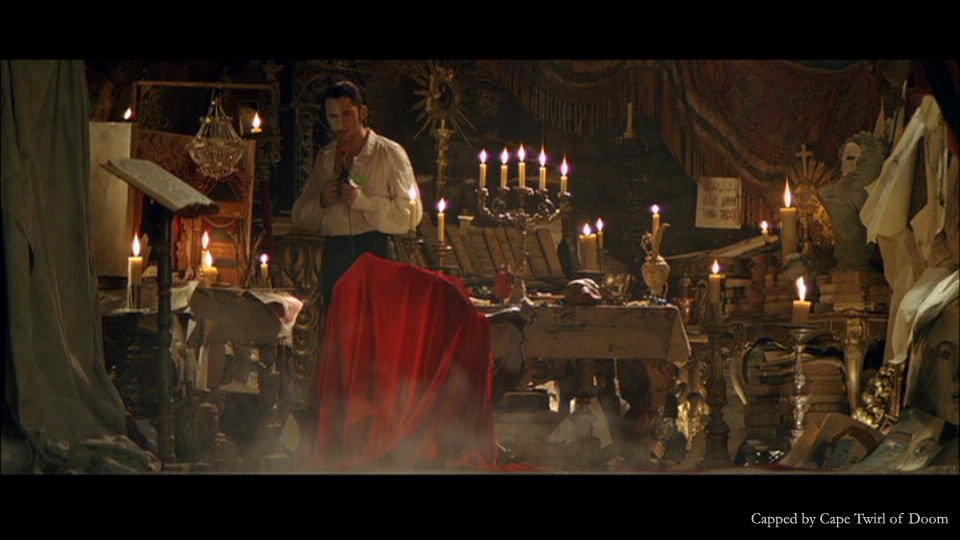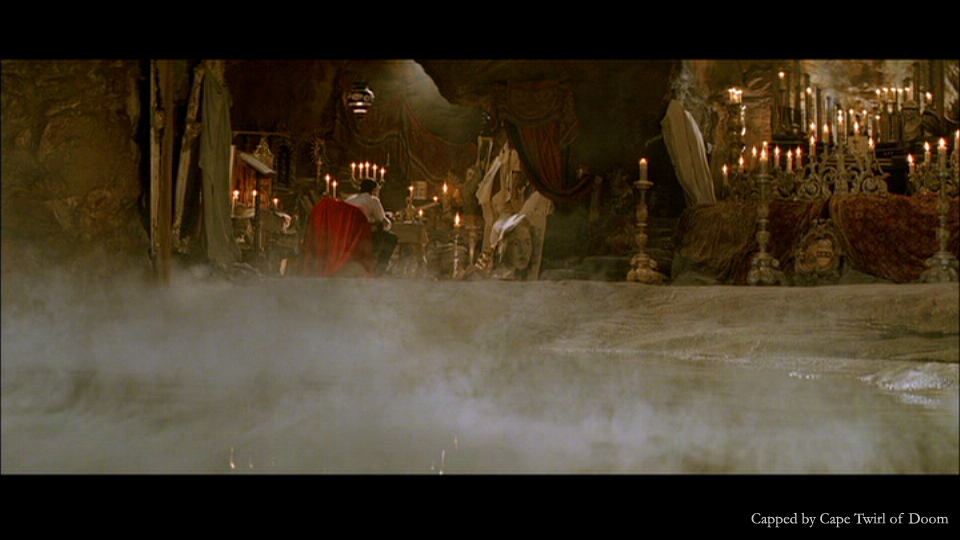ERIC'S HOUSE
"Down once more to the dungeon of
my black despair! Down we plunge to the prison of my mind!Down
that path into darkness, deep as hell!"
"...You are looking at my furniture?... It is all that I have left of my
poor unhappy mother" Eric
 The
middle of a drawing-room was decorated, adorned and furnished with nothing but
flowers, flowers both magnificent and stupid, because of the silk ribbons that
tied them to baskets, like those which they sell in the shops on the boulevards.
The
middle of a drawing-room was decorated, adorned and furnished with nothing but
flowers, flowers both magnificent and stupid, because of the silk ribbons that
tied them to baskets, like those which they sell in the shops on the boulevards.
The furniture, the hangings, the candles, the vases and the very flowers in
their baskets were bound to confine my imagination to the limits of a drawing-room
quite as commonplace as any that, at least, had the excuse of not being in the
cellars of the Opera.
A simply furnished little bedroom, with an ordinary mahogany bedstead, lit
by a lamp standing on the marble top of an old Louis-Philippe chest of drawers.
The wooden bedstead, the waxed mahogany chairs, the chest of drawers, those
brasses, the little square antimacassars carefully placed on the backs of the
chairs, the clock on the mantelpiece and the harmless-looking ebony caskets
at either end, lastly, the whatnot filled with shells, with red pin-cushions,
with mother-of-pearl boats and an enormous ostrich-egg, the whole discreetly
lighted by a shaded lamp standing on a small round table: this collection of
ugly, peaceable, reasonable furniture, AT THE BOTTOM OF THE OPERA CELLARS, bewildered
the imagination more than all the late fantastic happenings.
Words of Christine about his home: he opened
a door before me. `This is my bedroom, if you care to see it. It is rather curious.'
His manners, his words, his attitude gave me confidence and I went in without
hesitation. I felt as if I were entering the room of a dead person. The walls
were all hung with black, but, instead of the white trimmings that usually set
off that funereal upholstery, there was an enormous stave of music with the
notes of the DIES IRAE, many times repeated. In the middle of the room was a
canopy, from which hung curtains of red brocaded stuff, and, under the canopy,
an open coffin. `That is where I sleep,' said Erik. `One has to get used to
everything in life, even to eternity.' The sight upset me so much that I turned
away my head.
"Then I saw the keyboard of an organ which filled one whole side of the
walls. On the desk was a music-book covered with red notes. I asked leave to
look at it and read, `Don Juan Triumphant.' `Yes,' he said, `I compose sometimes.'
I began that work twenty years ago. When I have finished, I shall take it away
with me in that coffin and never wake up again.' `You must work at it as seldom
as you can,' I said. He replied, `I sometimes work at it for fourteen days and
nights together, during which I live on music only, and then I rest for years
at a time.' `Will you play me something out of your Don Juan Triumphant?' I
asked, thinking to please him. `You must never ask me that,' he said, in a gloomy
voice. `I will play you Mozart, if you like, which will only make you weep;
but my Don Juan, Christine, burns; and yet he is not struck by fire from Heaven.'
Thereupon we returned to the drawing-room. I noticed that there was no mirror
in the whole apartment. I was going to remark upon this, but Erik had already
sat down to the piano. He said, `You see, Christine, there is some music that
is so terrible that it consumes all those who approach it. Fortunately, you
have not come to that music yet, for you would lose all your pretty coloring
and nobody would know you when you returned to Paris. Let us sing something
from the Opera, Christine Daae.' He spoke these last words as though he were
flinging an insult at me."
And the figure of the masked man seemed all the more formidable in this old-fashioned,
neat and trim little frame.


 The
middle of a drawing-room was decorated, adorned and furnished with nothing but
flowers, flowers both magnificent and stupid, because of the silk ribbons that
tied them to baskets, like those which they sell in the shops on the boulevards.
The
middle of a drawing-room was decorated, adorned and furnished with nothing but
flowers, flowers both magnificent and stupid, because of the silk ribbons that
tied them to baskets, like those which they sell in the shops on the boulevards.
